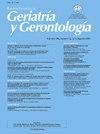[与失忆症轻度认知障碍相关的神经心理学标记和因素]。
Q3 Medicine
引用次数: 0
摘要
背景:轻度遗忘性认知障碍(aMCI)是一种以记忆抱怨为特征的认知缺陷综合征,其内表型转化为痴呆的比例最高,尤其是阿尔茨海默氏型。本研究的目的是建立与aMCI相关的神经心理学标志物和因素。方法:采用非概率方便抽样法,采用病例与对照相结合的横向描述性研究方法,抽取426名被试。平均年龄58.8±5.5岁,女性占57.3%(244人),大学学历184人(43.2%)。临床病史中,有高血压病史的占47.9%(204人),有抑郁症状的占37.6%(160人),有孤立倾向的占28.6%(122人)。通过神经心理学评估方案获得神经心理学标志物和相关因素的信息。结果:在aMCI组中,集中护理领域(OR: 10.74 95% CI 3.386-34.11)被发现是与无明显病理的受试者显著相关的因素;情景记忆(存储)(OR: 36.52 95% CI 15.14-88.05)和名称(OR: 5.043 95% CI 1.816-14.00)。结论:注意力集中、情景记忆(储存)和命名是与aMCI相关的神经心理指标;同样,与非健忘症为主的轻度认知障碍(anMCI)受试者相比,社会孤立被证明是与aMCI相关的一个因素。本文章由计算机程序翻译,如有差异,请以英文原文为准。
Marcadores neuropsicológicos y factores asociados al deterioro cognitivo leve amnésico
Background
Mild amnestic cognitive impairment (aMCI) is a syndrome in which there are cognitive deficits characterized by memory complaints, with the endophenotype with the highest rate of conversion to dementia, especially the Alzheimer type. The objective of the study was to establish neuropsychological markers and factors associated with aMCI.
Methods
Transversal descriptive study with case and control analysis, with a sample of 426 subjects selected by non-probabilistic convenience sampling. The average age was 58.8 ± 5.5 years, 57.3% (244) of the sample were women, and 184 subjects (43.2%) had university studies. The clinical history shows that 47.9% (204) had a clinical history of hypertension, followed by symptoms of depression with 37.6% (160) and a tendency to isolation with 28.6% (122). Information on neuropsychological markers and associated factors was obtained through a neuropsychological assessment protocol.
Results
In the aMCI group, the domains of: focused care (OR: 10.74 95% CI 3.386-34.11) were found as significantly associated factors with respect to subjects without apparent pathology; episodic memory (storage) (OR: 36.52 95% CI 15.14-88.05) and denomination (OR: 5.043 95% CI 1.816-14.00).
Conclusions
Focused attention, episodic memory (storage) and naming become neuropsychological markers associated with aMCI; likewise, social isolation is shown to be a factor associated with aMCI when compared to subjects with non-amnestic predominant mild cognitive impairment (anMCI).
求助全文
通过发布文献求助,成功后即可免费获取论文全文。
去求助
来源期刊

Revista Espanola de Geriatria y Gerontologia
Medicine-Medicine (miscellaneous)
CiteScore
1.90
自引率
0.00%
发文量
62
审稿时长
85 days
期刊介绍:
Una revista de gran prestigio por sus artículos originales de investigación y revisiones. Permite cubrir todas las áreas de la medicina pero siempre desde la atención al paciente anciano, y está presente en los más reconocidos índices internacionales.
 求助内容:
求助内容: 应助结果提醒方式:
应助结果提醒方式:


